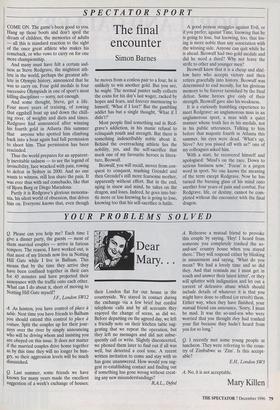SPECTATOR SPORT
The final encounter
Simon Barnes
COME ON. The game's been good to you. Hang up those boots and don't spoil the dream of children, the memories of adults — all this is standard reaction to the sight of the once great athlete who makes his comeback, or who vows to carry on for one more championship. And many must have felt a certain sad- ness as Steve Redgrave, the mightiest ath- lete in the world, perhaps the greatest ath- lete in Olympic history, announced that he was to carry on. Four gold medals in four successive Olympiads in one of sport's most killing disciplines — sorry, not enough.
And some thought, Steve, get a life. Four more years of training, of rowing that eggshell boat up and down the chill- ing river, of weights and diets and times. Redgrave had announced after winning his fourth gold in Atlanta this summer that anyone who spotted him climbing back into a boat again had full permission to shoot him. That permission has been rescinded.
Thus the world prepares for an apparent- ly inevitable sadness — to see the legend of invincibility, face wracked with pain, rowing to defeat in Sydney in 2000. And no one wants to witness, still less share the pain. It was ever thus with sad comebacks, like that of Bjorn Borg or Diego Maradona.
Partly it is Redgrave's glorious monoma- nia, his silent world of obsession, that drives him on. Everyone knows that, even though he moves from a coxless pair to a four, he is unlikely to win another gold. But you see, he might. The normal punter sadly collects the coins for his day's last wager, racked by hopes and fears, and forever murmuring to himself, 'What if I lost?' But the gambling addict has but a single thought, 'What if I didn't?'
Most people find something sad in Red- grave's addiction, in his manic refusal to relinquish youth and strength. But there is something indescribably noble about it. Behind the overreaching athlete lies the nobility, yes, and the self-sacrifice that mark one of my favourite heroes in litera- ture, Beowulf.
Beowulf, you will recall, moves from con- quest to conquest, mashing Grendel and then Grendel's still more fearsome mother, apparently without effort. But in the end, aging in sinew and mind, he takes on the dragon, and loses. Indeed, he goes into bat- tle more or less knowing he is going to lose, knowing too that his self-sacrifice is futile. A good person struggles against Evil, or if you prefer, against Time, knowing that he is going to lose, but knowing, too, that los- ing is more noble than any association with the winning side. Anyone can quit while he is ahead. Beowulf had two gold medals and did he need a third? Why not leave the strife to other and younger men?
Beowulf knew that it is a cheap and shul- low hero who accepts victory and then retires gracefully into history. Beowulf was determined to end messily, for his glorious memory to be forever tarnished by the final defeat. Some heroes give only of their strength, Beowulf gave also his weakness.
It is a curiously humbling experience to meet Redgrave: an unglamorous man in an unglamorous sport, a man with a quiet manner whose truth lies in his medals, not in his public utterances. Talking to him before that majestic fourth in Atlanta this summer, his eyes were dead. 'What's up, Steve? Are you pissed off with us?' one of my colleagues asked him.
With a start, he recovered himself and apologised: 'Mind's on the race. Down to serious business now.' Focus' is a jargon word in sport. No one knows the meaning of the term except Redgrave. Now he has turned the burning glass of his mind onto another four years of pain and combat. For Redgrave, life, or destiny, cannot be com- pleted without the encounter with the final dragon.


















































































 Previous page
Previous page